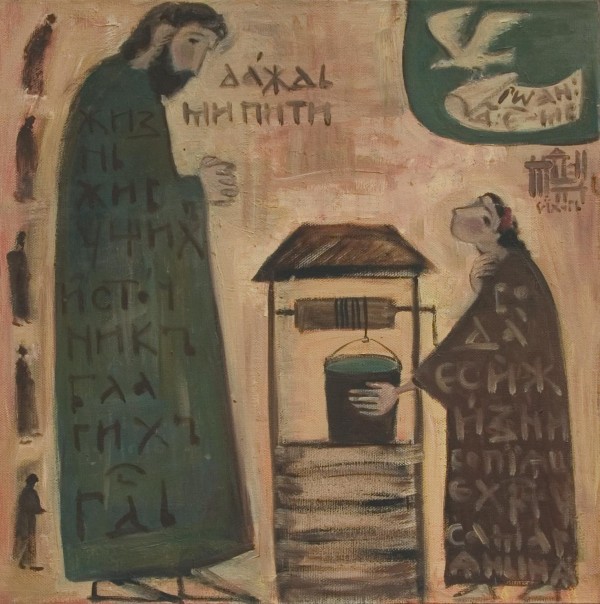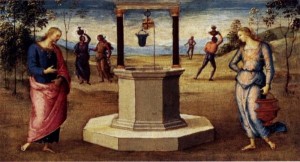John 4:5-42
5Then cometh he to a city of Samaria, which is called Sychar, near to the parcel of ground that Jacob gave to his son Joseph.
6 Now Jacob’s well was there. Jesus therefore, being wearied with his journey, sat thus on the well: andit was about the sixth hour.
7 There cometh a woman of Samaria to draw water: Jesus saith unto her, Give me to drink.
8 (For his disciples were gone away unto the city to buy meat.)
9 Then saith the woman of Samaria unto him, How is it that thou, being a Jew, askest drink of me, which am a woman of Samaria? for the Jews have no dealings with the Samaritans.
10 Jesus answered and said unto her, If thou knewest the gift of God, and who it is that saith to thee, Give me to drink; thou wouldest have asked of him, and he would have given thee living water.
11 The woman saith unto him, Sir, thou hast nothing to draw with, and the well is deep: from whence then hast thou that living water?
12 Art thou greater than our father Jacob, which gave us the well, and drank thereof himself, and his children, and his cattle?
13 Jesus answered and said unto her, Whosoever drinketh of this water shall thirst again:
14 But whosoever drinketh of the water that I shall give him shall never thirst; but the water that I shall give him shall be in him a well of water springing up into everlasting life.
15 The woman saith unto him, Sir, give me this water, that I thirst not, neither come hither to draw.
16 Jesus saith unto her, Go, call thy husband, and come hither.
17 The woman answered and said, I have no husband. Jesus said unto her, Thou hast well said, I have no husband:
18 For thou hast had five husbands; and he whom thou now hast is not thy husband: in that saidst thou truly.
19 The woman saith unto him, Sir, I perceive that thou art a prophet.
20 Our fathers worshipped in this mountain; and ye say, that in Jerusalem is the place where men ought to worship.
21 Jesus saith unto her, Woman, believe me, the hour cometh, when ye shall neither in this mountain, nor yet at Jerusalem, worship the Father.
22 Ye worship ye know not what: we know what we worship: for salvation is of the Jews.
23 But the hour cometh, and now is, when the true worshippers shall worship the Father in spirit and in truth: for the Father seeketh such to worship him.
24 God is a Spirit: and they that worship him must worship him in spirit and in truth.
25 The woman saith unto him, I know that Messias cometh, which is called Christ: when he is come, he will tell us all things.
26 Jesus saith unto her, I that speak unto thee am he.
27 And upon this came his disciples, and marvelled that he talked with the woman: yet no man said, What seekest thou? or, Why talkest thou with her?
28 The woman then left her waterpot, and went her way into the city, and saith to the men,
29 Come, see a man, which told me all things that ever I did: is not this the Christ?
30 Then they went out of the city, and came unto him.
31 In the mean while his disciples prayed him, saying, Master, eat.
32 But he said unto them, I have meat to eat that ye know not of.
33 Therefore said the disciples one to another, Hath any man brought him ought to eat?
34 Jesus saith unto them, My meat is to do the will of him that sent me, and to finish his work.
35 Say not ye, There are yet four months, and then cometh harvest? behold, I say unto you, Lift up your eyes, and look on the fields; for they are white already to harvest.
36 And he that reapeth receiveth wages, and gathereth fruit unto life eternal: that both he that soweth and he that reapeth may rejoice together.
37 And herein is that saying true, One soweth, and another reapeth.
38 I sent you to reap that whereon ye bestowed no labour: other men laboured, and ye are entered into their labours.
39 And many of the Samaritans of that city believed on him for the saying of the woman, which testified, He told me all that ever I did.
40 So when the Samaritans were come unto him, they besought him that he would tarry with them: and he abode there two days.
41 And many more believed because of his own word;
42 And said unto the woman, Now we believe, not because of thy saying: for we have heard him ourselves, and know that this is indeed the Christ, the Saviour of the world.
When the Samaritan woman came back in haste to her town and called all those who lived around her to see Christ, she said: ‘Come! Here is a Man who has told me everything I have done!’ And the people flocked around, and listened to what Christ had to say.
At times we think, how easy it was for this woman to believe and how easy it was for her, from within this shattering experience to turn to others and say: Come! Listen to one who has spoken as no-one else has ever spoken, One Who, without a word of mine has seen into the depth of my heart, into the darkness of my life, has seen and known everything.
But is it not something that can happen to each of us? Christ did not tell her anything very singular; He told her who she was, what her life had been, how God saw her. But this He can tell us every day of our life, and not in a mystical experience, not as it happened to some saints, but in the simplest possible way.
If we turn to the Gospel and read it every day, or if we simply read it once in a while with an openness that we do not always possess, we may think that Christ holds before our eyes a mirror in which we see ourselves as we are: either by rejoicing at what we see, or by contrast, being shaken by the fact that we are so different from what we seem to be, or what we imagine we are.
Christ said to the Samaritan woman: Call your husband! And she said: I have no husband. Christ replied: You have spoken the truth. You have had five husbands, and the one who is your husband now indeed, is not your husband more than anyone else.
Certain spiritual writers have commented on this passage by saying that Christ was saying to her: Yes — you have been wedded to all that your five senses could give you, and you have seen that you find fulfilment, satisfaction in none. And now, what is left to you is your own self, your body, your mind, and this, no more than your five senses can fulfil you, give you that fullness without which you cannot live.
Is this not what Christ says to us when we read the Gospel, when He presents us with what we could be, when He calls us to that greatness which is ours by vocation; the greatness that Paul describes by calling us to reach the fullness of the stature of Christ — to be human as He was, in the same way as Christ is true man, fulfilled by total final, full communion with God.
So let us learn from this woman that we have turned, all of us, to so may ways in which we could receive the message of this world and be filled, and we have all discovered, that nothing can fill us, because man is too deep for things material, too deep for things psychological, too vast — only God can fill this vastness and this depth. If we only could realise this, we would be exactly in the position of the woman of Samaria. We need not meet Christ at the well; the well, indeed, is the Gospel, the place from which the water of life may gush — but not a material well, that well is a symbol. The water which we are to drink is different…
And so, let us emulate this woman, let us come to our senses, let us realise that all we have been wedded to was not our fulfilment; and let us then ask ourselves “Who am I, with regard to myself in the dimension of God’s vision?” And then we can go to others and say: I have met someone who has held a mirror before my eyes, and I have seen myself as I am, He has told me about myself: come and see! Come — and listen to Him! …. And others will come, others will listen, and then they will turn to us and say: It is no longer your testimony that makes us believe — we have seen for ourselves, we have heard for ourselves, we know for ourselves. We believe. Amen.





















